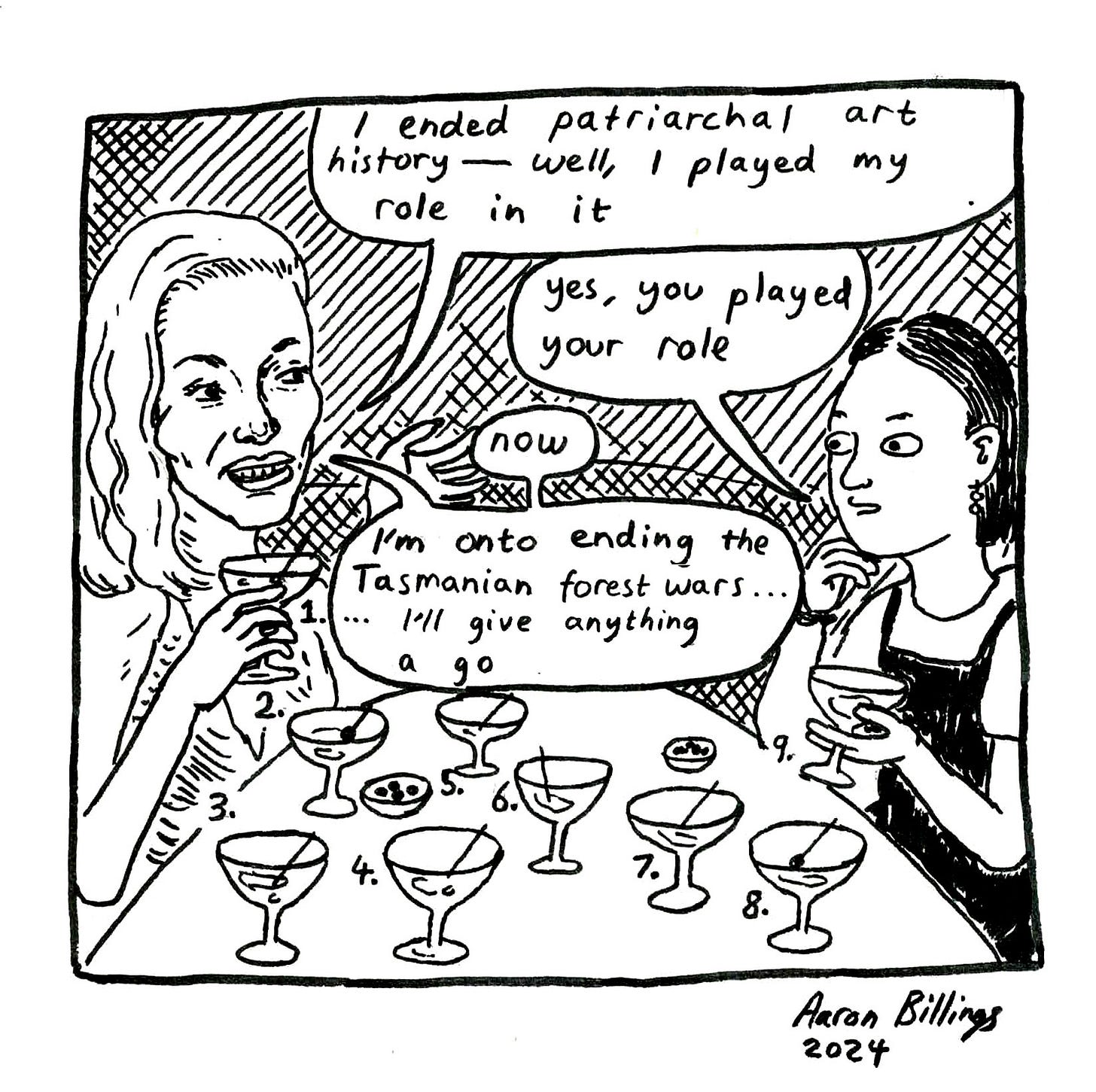The eagle had landed. Kirsha Kaechele—First Lady of Mona, Picasso forger extraordinaire, feminist, wife, mother, diplomat (?)—was in Melbourne. After all the recent drama with the Ladies Lounge, a women's-only art installation at Mona that landed her and the Hobart gallery in a much-publicised legal stoush, there was no question about it. The Paris End had to Get The Interview. So, our people got in touch with Kirsha's people. One martini emoji led to another, and before long, we had agreed to meet at City Wine Shop at 4pm. She did not send a confirmation text. Chic.
Kirsha appeared on the crest of Spring St, accompanied by her rich gambler husband and Mona museum boss, David Walsh. On this brisk Melbourne winter afternoon, she wore a jaunty, cloche-style black hat, black coat, leopard print skirt, and bright red lip. Her long, strawberry blonde hair was tossed to one side. Walsh, with tousled grey-white hair and spectacles, was in a bright red jumper.
We greeted one another on the footpath. An issue arose: would David join us now or go for a walk and join us later? Negotiation ensued, both verbal and subliminal. Kirsha pouted. David frowned. Mum… Dad… please don't fight, I thought. An agreement was reached swiftly without my participation. David meandered off, promising to return in forty-five minutes. Kirsha and I entered the restaurant.
It was busy: Friday afternoon. Wines were being poured, lawyers were exchanging hushed confidences, and the waitresses had their eyeliner on and hair pulled up tightly, ready for the city's weekend rush. We picked a spot on the long table in the back room—quieter, more intimate—and ordered two martinis. Kirsha chose vodka. I went with gin. Then we settled into our chairs, shuffling, making small talk. She pulled her coat down her shoulders a little. I fiddled with my phone and turned it face-down on the table. The martinis arrived: icy, translucent, and punctuated by glistening green olives, three of them, lined up like ellipses…
I looked at Kirsha. She was beautiful and tiny and had big, intense eyes. She looked at me. Before we’d spoken on the phone, she’d thought I was a man—I hoped she wasn't disappointed. Too late now. We clinked our glasses, and started our interview proper. It was only right to begin with the Ladies Lounge.
In the doldrums of 2020, Kirsha decided to create a special installation at Mona. It was a green-velvet-curtained room that only women (all-inclusive) were allowed to enter. Inside, the women would be serviced by handsome butlers (fed oysters, have toes sucked, etc.) while they gazed at artworks displayed in bright golden frames, and reclined in a chair constructed to look like a “rearing phallus.” The artwork wall labels told the story of an heiress, Kirsha Kaechele, whose intrepid ancestors had left her with an exceptional art collection. Her great-grandmother, it was implied, had made love to Picasso, a dalliance that ended in heartbreak, a trail of empty champagne bottles, and some priceless heirloom paintings. A few Papua New Guinean spears had come down from her grandfather, who had been devoured by “cannibals.” A mink rug came straight from the furrier of Princess Mary. Together, these heirlooms, which were to be handled only with velvet monogrammed “KK” gloves, told the story of an extremely privileged woman. It was despicable. The only consolation was that KK would be sharing this cabinet of curiosities with women visiting Mona. The project was called the “Ladies Lounge.”
“It felt like an important moment to do it, because it [2020] was a Pol Pot moment of woke,” Kirsha told me. She has an American accent that's not not Transatlantic. “I was telling my young friends, ‘watch out. Pol Pot was a lefty. You may take this too far.’ Suddenly you're going to be beheading your enemies. You're going to kill everyone who wears glasses.”
I blinked my contact lenses firmly back into place. The pseudo-primitivist narrative about spear acquisition seemed designed specifically to trigger postcolonial theorists, it was true. But recently, the mainstream public reception of the work had taken on a narrative that seemed more aligned with the Hannah Gadsby side of art history. That is (hate to say it) woke—and bypassing more interesting debates that could be had about Kaechele's provocations.
In 2024, the Lounge had become the subject of a click-bait gold international news story, with Kirsha cast in the role of radical feminist culture warrior. A man named Jason Lau had come down to Hobart from New South Wales and paid thirty-five bucks for a museum ticket. When he discovered that he would not be allowed into the Ladies Lounge, he was outraged. His Aussie dollars were as good as anyone else’s. He should be allowed into the girls’ chat. It was a matter of principle. Right? He decided to take legal action against Mona on the grounds of gender-based discrimination.
Keep reading with a 7-day free trial
Subscribe to The Paris End to keep reading this post and get 7 days of free access to the full post archives.




